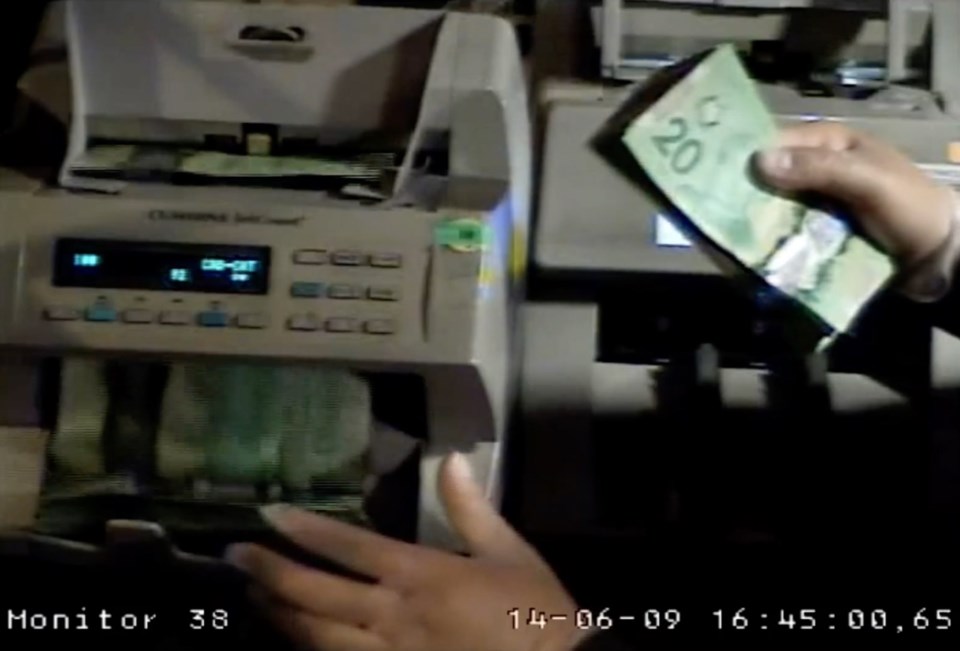A major money laundering investigation into B.C. casinos will not result in any criminal charges, the BC Prosecution Service (BCPS) announced in a statement Wednesday following an independent prosecutor's assessment.
E-Nationalize was considered by the Combined Forces Special Enforcement Unit of British Columbia (CFSEU-BC) “to be one of the largest investigations in CFSEU-BC’s history, surpassing even the Jonathan Bacon murder investigation that spanned almost seven years.”
CFSEU stated in April 2019 the investigation was “likely to set an investigative benchmark and precedent for future money laundering investigations by Canadian law enforcement.”
This will not be the case, however, after two assessments — an initial one by Crown prosecutors and a subsequent independent one by Victoria-based criminal lawyer Christopher Considine KC.
Although the investigation tracked millions of dollars of suspicious cash moving from an unregistered money service business in Richmond to local casino gamblers, Considine stated he was reticent to move forward with charges as police could not identify a “viable” predicate offence, most notably that the cash originated from drug trafficking. Further hindering the case was the sheer volume of documents, most of which were in Mandarin.
The investigation tracked money transfers from China and was referenced at times by witnesses at the Cullen Commission of Inquiry into Money Laundering in B.C.
CFSEU and the Joint Illegal Gaming Investigations Team (JIGIT) concluded the investigation in early 2021, when a report to Crown counsel was submitted recommending a variety of charges under the Criminal Code.
"The BCPS concluded that the charge assessment standard had not been met and no charges would be approved," BCPS stated.
However, on Nov. 26, 2021, then B.C. Attorney General David Eby issued a directive to the Assistant Deputy Attorney General Peter Juk to conduct an independent charge assessment, stated BCPS.
Eby’s letter to Juk was published by the BCPS within its statement Wednesday. The letter describes how charges against the key investigation subject, alleged money launderer and Richmond resident Paul King Jin, were not approved as “there was not a substantial likelihood of conviction” and “even if there was a substantial likelihood of conviction, the public interest did not require a prosecution, considering the anticipated length and expense of a potential prosecution as compared to overall societal benefit to be gained from it.”
Eby pushed forward with the second assessment, however, acknowledging there may be a “possible path to prosecuting Mr. Jin for money laundering and other offences” and “it is my opinion that there is a strong public interest in conducting a prosecution.”
On March 11, 2022, Considine began his review of the case.
The BCPS issued Considine’s clear statement on the decision in which Considine used the letter ‘X’ to identify the investigation’s key target and the letters ‘A’ and ‘B’ to reference two illegal money service business operators.
According to civil forfeiture filings, Jin allegedly used the money service business Silver International operated by Jian Jun Zhu and Caixuan Qin. Zhu was shot dead in a Richmond restaurant in September 2020 while dining with Jin.
“The investigation revealed that between February 4 and May 19, 2017, X received approx. $5.4 million in bulk cash from A and B; provided over $6 million in cash, bank drafts or casino chips to clients; and arranged for the deposit of approx. $7.2 million into the Chinese bank accounts associated to A and B,” explained Considine.
The issue for Considine is that police did not prove where the cash coming into the money service business was coming from.
“These pieces of evidence taken together do not lead to the inexorable conclusion that A or B derived the cash supplied to X from drug trafficking. I am bolstered in this conclusion by the fact that CFSEU themselves did not propose drug trafficking as a predicate offence.”
It’s unclear how the RCMP was not able to track the money coming into the money service business, in which Jin was withdrawing from.
Instead, the money laundering charges were to be based on the fact the money service business was unregistered.
However, Considine noted that although the law “criminalizes the failure to register, it does not criminalize the operation of a money service business in the absence of registration.”
With these doubts, Considine also stated that disclosure of the evidence to defence would be substantial, noting the investigation produced 41,877 documents, 90 seized smart phones, including 77,643 logged calls, 15,117 unique chats, over 1.6 million chat messages, 4,458 emails and 22,048 text messages, mostly in Mandarin.
“If charges were laid as a result of the E-Nationalize investigation, the Crown would have an obligation to disclose to defence all information in its possession of potential relevance to the defence. The extent to which the above-described information would meet that relevance threshold would likely be the subject of considerable dispute,” stated Considine, adding this could be overcome were it the only problem.
The investigation, said the RCMP, involved “over 400 police resources connected to the file,” which included “the synthesis, correlation and analysis of voluminous amount of complex and technical evidence which was mostly in languages other than English.”
Considine concluded his statement by encouraging legislative changes to money service businesses, especially to make using unregistered ones a predicate crime.



